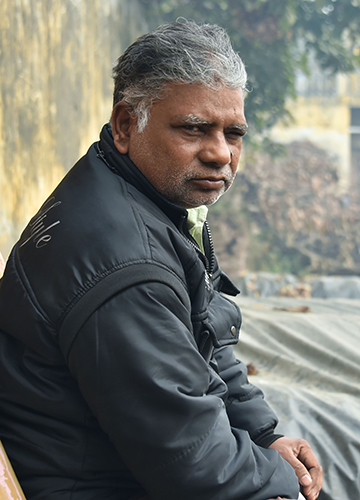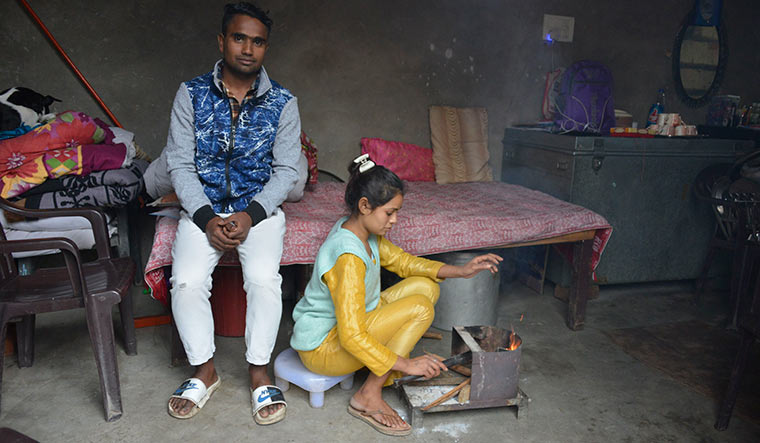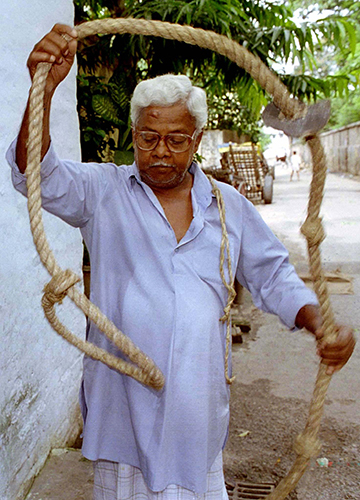The first time Pawan Kumar Jallad assisted his grandfather, Kallu Ram, as a hangman, he was all of 23. The year was 1988. At the Patiala Central Jail, two brothers sentenced to death in a case of family violence were snuffed out of existence at the hands of expert executioner Kallu Ram. On the phone from Meerut before agreeing to meet us, Pawan, 54, says that the Patiala hanging was the most valuable learning experience in carrying out a perfect legal execution. You might expect him to offer details on the nature of the knot or the size of the noose as per the physique of the convict, but Pawan, whose profession is tied to his identity, thanks to his surname (Jallad, in Hindi, means executioner), is not so detail-oriented. “No, I did not feel anything on my first day,” he deadpans. He outlines the sequence of a hanging in a rough, staccato, businesslike fashion: “First, you tie the legs, then you put the cloth over the head, then you place the noose around the neck and then pull the lever. Two brothers hanged together; one plank, one lever.”
also read
- Journalist Mukesh Chandrakar's murder highlights challenges of a conflict zone in Bastar
- Periya double-murder case: Kerala High Court stays conviction of ex-MLA Kunhiraman, three others
- Anna University sexual assault: Madras High Court reminds society can't dictate how a woman should live, wants action against Chennai Commissioner
- UP news: Jilted lover castrates boyfriend who wanted to break up and marry another woman; but why is it called 'bobbittised' ?
- New York: Woman dies after being set on fire on Brooklyn subway; suspect watched her burn alive, says police
With the Nirbhaya convicts' execution, Pawan, for the first time in his career as a professional hangman, will execute a hanging entirely on his own. On the gallows at Delhi’s Tihar Jail will be the four Nirbhaya gang-rape convicts—Mukesh Singh, Vinay Sharma, Akshay Singh and Pawan Gupta. The four death row convicts, says Pawan, could be hanged all at once, with no special technique required. And, he needs no assistance; his seven children and grandchildren are not interested to learn the trade. “I will be going alone from Meerut. I am enough to carry out this job on my own,” says Pawan, with a hint of defiance. Modern history’s most prolific hangman, Albert Pierrepoint, who between 1931 and 1956 carried out more than 400 executions, wrote in his 1974 memoir, “I do not now believe that any one of the hundreds of executions I carried out has in any way acted as a deterrent against future murder. Capital punishment, in my view, achieved nothing except revenge.” But Pawan is not likely to agree with Pierrepoint; he has not had the luxury of plenty to arrive at such an insight. While his grandfather carried out some 15 hangings and his father two, Pawan has none to claim his own. In 2014, he came close to executing his first hanging after he applied for certification as a hangman following his father’s death in 2011. He was to hang to death Surinder Koli, the domestic help convicted for multiple murders in the shocking Nithari killings in the house of businessman Moninder Singh Pandher in Noida. But the reprieve for Koli by the Supreme Court was a bitter pill Pawan had to swallow. And if Pawan is now looking forward to enact this choreography of death—and justify an emotionally Herculean family trade passed down through generations—he is doing a splendid job of hiding his eagerness. “Aisa kuch nahi hai (It is not like that),” is his recurring response to most questions, even as local reporters wonder how he has become so quiet after being fond of giving sound bites in the past. There are articles on how he has done test runs with sandbags and pictures of him holding a perfectly knotted rope. In one video, Pawan talks about how he will make the convicts suffer before he hangs them by the neck. “No, I cannot do that. There are rules. There is only one way to hang criminals. I have learnt it from my grandfather who is my guru,” says a wiser, much more contained Pawan. “These are orders from the Supreme Court and that have to be honoured.”
THEATRE OF THE ABSURD
A tight-lipped Pawan, waiting for his debut, is a stark contrast to a curious case of a veteran hangman whose media scrutiny replaced the perverse thrill and spectacle of public executions in medieval Europe. The national limelight trained on this hangman was for yet another sensational rape case. In 1994, Dhananjoy Chatterjee was sentenced to death four years after raping and killing a teenaged girl in Kolkata. He was hanged on August 14, 2004, at the Alipore Central Correctional Home, bringing to a close a decade-long controversy over his death sentence. His hangman was Nata Mullick, then 83, for whom Dhananjoy was the last of the 25 executions he carried out in his career. Nata’s father, Shib Lal, carried out some 500 hangings in colonial India, according to unverified reports. Reams and reams of newsprint and 24x7 live television footage were expended for a month, tracking Nata’s movements, his philosophy and moral universe in the days leading up to the appointed hour, and how he broke down and fainted minutes after the hanging, so taken aback he was by Dhananjoy’s calm demeanour and lack of resistance. In 2009, Nata died of age-related complications.
Nata had allowed himself to be filmed for a documentary, too, for which he was followed for 24 hours from 9am on August 13, 2004, to the dawn of the execution day. “Nata had a list for the rates he would charge for interviews, from print media, news channels and filmmaking. He asked 010,000 and a bottle of (McDowell’s No 1) Celebration rum from me,” says Joshy Joseph, whose feature-length documentary, One Day from a Hangman’s Life, was banned from screening for a while in West Bengal by the then Buddhadeb Bhattacharjee government.
Joshy, who now works with the Films Division, remembers how Nata was the most media-friendly hangman in the way he made himself so visible and articulate. Joshy struck a deal with him for the shoot days before the hanging because Nata had deftly gauged the mood of the media and how he could make money out of it. His film intended to expose the soap opera-like media circus around the case and the storyteller within Nata who had convinced himself—being the actual person saddled with the responsibility of carrying out the killing—that by demonising the victim, he was going to hang not a human being but a devil incarnate. “I went to his small, dingy room in the morning with a cameraman and we were the only ones there in his house near the Tipu Sultan Masjid in Kolkata,” recalls Joshy, who was more interested in capturing the mundane silences of the hangman, because Nata was otherwise fond of talking. “He was a fantastic artist, very camera friendly. He was also a jatra performer and once acted as a hangman in a Mrinal Sen film starring Mithun Chakraborty. He knew all about retakes and at one point even took over the camera.”
Joshy shows in his documentary how on the morning of the hanging, Nata did a mock aarti with a lit cigarette in front of his late father’s picture. He then pulled out a bottle of rum from a cupboard full of alcohol bottles and sprinkled some on his father’s picture as a purification ritual asking for blessings, all the while spouting dialogues about how the society is in danger because of criminals like Dhananjoy.
“The moment I started recording his silences, he became really uncomfortable,” says Joshy. “All the channels were only taking his bites, whereas I was also recording his silences. The moment he found we kept our cameras rolling and were recording his silences, he became hostile, demanding how this is not in our contract.” His 83-minute documentary was also the inspiration for author and journalist K.R. Meera’s award-winning Malayalam novel Aarachaar (Hangwoman: Everyone Loves a Good Hanging), where Chetna, a strong, determined woman from an illustrious family of hangmen and with years of accumulated knowledge has to fight hard to take on the mantle of an executioner in Bengal. “His silence was a metaphor for the sheer violence involved in this theatre of hanging. His belligerent reaction to recording his silences stand for the hidden violence that eats up the hangman from within,” says Joshy, who does not think capital punishment and crime graphs are in any way related. He rather thinks that hangings are often politically motivated to appease vote banks and the cycle of violence will continue. When Nata saw the film on the first day it premiered in Nandan Cinema in Kolkata, Jospeh remembers feeling scared of his subject’s reaction. In the last conversation he had with Nata, the hangman said before riding away in a taxi, “You are not a man of your word. You filmed everything. But what a fabulous film it is!”
THE PROFESSIONAL HANGMAN
“Nata Mullick? He did one hanging and he caught fever,” says Pawan, laughing. He agrees to meet THE WEEK in front of a police station not very far from his house near Hapur road in Meerut. He boasts how he is the third-generation hangman in his family. “What? Nata also had hangmen in his family? Oh, I see,” he replies, thoughtfully. Short and stocky, trussed up in a black jacket emblazoned with the words ‘New Style’ and a star-spangled woollen cap, Pawan mostly evades eye contact but is affable and easily given to laughs. “I think I am constantly trying to rescue myself from the media. Sometimes I tell them I am in Delhi, sometimes Dehradun, sometimes Saharanpur. They have not allowed me to sleep for even two hours,” he complains, almost with a pleased look, while piling up dry kindling for a bonfire. “My salary is only Rs5,000. My family is very poor. I have been pleading with the government for so long to make our salary Rs20,000.”
Pawan dropped out of school in class eight. He has mostly earned his daily bread doing odd jobs, patching tyres or hawking clothes. He lives in a one-room house he was given some eight years ago in a low-income housing complex in Kanshiram colony. But his family of five daughters, two sons and his wife live separately in their old house in another part of town far away from Hapur road. Neighbours in his colony would tell you that he does not get along with his family members and mostly keeps to himself, lost in thoughts. Some even say that he is slightly crazy, prying into the lives of his neighbours and playing off one against the other. But Anjum, who lives on the floor above his house, is all praises. Her family prepares all his meals. “He is a loving, warm person. Who would say he is a hangman? He does not have any of the qualities of a hangman,” says Anjum.
Pawan’s children are busy with their lives and seem proud of their father’s profession, betraying no signs of family discord. His youngest daughter, Vandana, is in her final year of graduation (commerce), and plans to pursue her master’s next. She says her family is treated like celebrities in her neighbourhood and college. “The accused in the Nirbhaya case deserve to be hanged,” she says. “In this neighbourhood, no one will dare make a pass at me.” Pawan bursts out laughing at the idea of a hangwoman, but he would like his sons to learn the family trade if they be so willing. But he knows there is time before he hangs up his noose. “I am ready now. I have practised enough. Now whenever they call me to Delhi, I will be on my way. Whatever they give me for the job, I will gracefully accept,” says Pawan, almost tired of waiting to see the end of the Nirbhaya case which will also be a milestone in his career—to be one of the central characters in the concluding part of an eight-year-long saga. He firmly believes the encounter killings of those accused in the Hyderabad rape case was well deserved. “Minors are getting raped regularly in the country. In the Nirbhaya case, the punishment should be as severe as possible. It will be a warning that such crimes will not be tolerated anymore,” says Pawan. He does not want to breathe a word to the convicts before he pulls the lever. “We are not allowed to talk to the convicts,” he says curtly.
AN AGENT OF JUSTICE?
The number of death sentences given out by trial courts in 2019 came down to 102 from 186 in 2018, according to a recent data report published in the Economic Times. But the article notes how the share of death sentences for sexual crimes have gone up, seen as “more deserving” within those numbers. In the last 10 years, there have been three hangings—Ajmal Kasab, Afzal Guru and Yakub Memon on cases of terrorism; the identity of the hangmen for the executions of the three has been kept a secret for security reasons. But for crimes of sexual nature, both in the Dhananjoy case and the Nirbhaya case, the names of the hangmen are no secret.
Criminal psychologist, social activist and advocate Anuja Trehan Kapur says the Nirbhaya gang-rape case has gone beyond questions of death penalty or life imprisonment. It is all about justice, the failure of it because of lacunae in the law and how women refuse to remain victims anymore. The hangman here is only an agent of that justice, representing the collective anger at limited conviction rates of rapists and perpetrators of crimes against women. “Look at the number of people volunteering to become hangmen for the Nirbhaya convicts,” points out Kapur, who is particularly riled up with the number of accused rights that have been invoked in the Nirbhaya case with all the mercy, curative and review petitions. “It is almost as if Nirbhaya’s mother is on death penalty.” Kapur, however, recognises that death penalty is mostly instant gratification. Hangmen, she says, are just doing their jobs. “It is a government job which has its own dignity,” she says. “When the hangman has to bring food to his family, he will not think if he is taking a life. It is like being a soldier at the border. What is the difference?”
Sukanyeah Krishna, a Bengaluru-based transgender activist and actor in the Malayalam film industry, has just wrapped up the shooting for her first film and wants to gift the remuneration she got for it, to Pawan’s daughter, because she read somewhere that the hangman needs money to get his daughter married. She, too, has been desperately trying to reach him. “As a transwoman, I have suffered enough abuse from childhood to understand Nirbhaya’s pain. The events of December 16, 2012, always have a triggering effect on me. Even I was a victim once and I wanted to kill those people in the past but I did not even have food to eat back then,” says Sukanyeah, choking on the phone. She makes it very clear that this is not a publicity stunt for her upcoming film; she does not even want to name her film. “I am so haunted by this constant cycle of news on rapes. Our system is doing nothing against these rapists,” she says. “At least when somebody is killing them, through law or not, I just want to thank them and tell them you did a good thing. This is the least I can do.”





